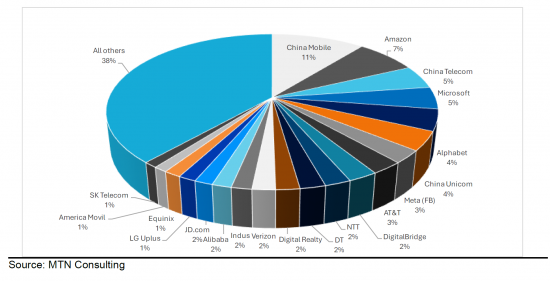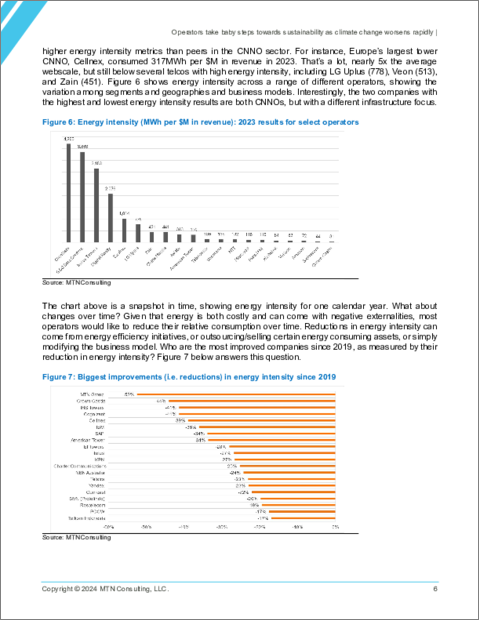|
|
市場調査レポート
商品コード
1619728
気候変動が急速に悪化する中、事業者は持続可能性に向けた第一歩を踏み出すOperators Take Baby Steps Towards Sustainability as Climate Change Worsens Rapidly |
||||||
|
|||||||
| 気候変動が急速に悪化する中、事業者は持続可能性に向けた第一歩を踏み出す |
|
出版日: 2024年12月20日
発行: MTN Consulting, LLC
ページ情報: 英文 10 Pages
納期: 即納可能
|
全表示
- 概要
- 図表
- 目次
通信事業者によるエネルギー使用量の増加は、2023年には前年比4%増で減速しました。しかし通信事業者は気候変動の最大の悪化要因でもあります。排出量は減少しておらず、再生可能エネルギーの導入を加速させる必要があります。中国はひどく遅れています。
当レポートでは、世界のネットワーク事業者のエネルギー消費と環境政策に焦点を当て、エネルギー需要、再生可能エネルギーの利用、排出量、エネルギー効率の取り組みに関するデータを紹介しています。本レポートは、2023年に発行されたレポートに新たなデータと分析を加えて更新したものです。
ビジュアル
通信事業者上位20社のエネルギー消費量内訳 (2023年)

気候変動に対処するための世界のさまざまな取り組みは大きく不足しています。国連によれば、現在の気候政策では、2100年までに3.1℃以上の地球温暖化が起こるとされています。これは2015年のパリ協定で合意された温暖化レベルの2倍にあたります。世界のヘッドラインをざっと見渡せば、すでに多くの異常気象、人の移動、大きな経済的被害が発生しています。このままでは、地球は人類にとって年々住みにくくなるでしょう。人類は、経済をより持続可能な軌道に乗せるよりも、最後の大嵐の後始末に時間とお金を費やすことになるでしょう。
理論上、技術企業には気候変動との闘いを主導する機会があると考えられていますが、実際には、ネットワーク事業者は大きく失敗しています。2023年のエネルギー消費量は、3セグメント合計で引き続き増加しました。成長率は、過去3年間の約9%から、2023年には4%へと減速しました。成長が鈍化したことはプラスですが、収益の伸びがさらに鈍化したため、エネルギー原単位がわずかに上昇したことや、最近ウェブスケール分野でAIデータセンターへの投資が爆発的に増加したことが、おそらく2024年のトレンドラインを変える見通しです。
再生可能エネルギーはどうでしょうか?再生可能でカーボンフリーであれば、エネルギー消費は本質的に悪いことではありません。自動車に燃料が必要なように、経済を動かすにはエネルギーが必要です。しかし、通信事業者のデータには当惑させられます。2023年には、通信事業者が消費するエネルギー総量の19.9%を再生可能エネルギーが占めました。この数字は年々上昇しており、2019年の10.3%から上昇しています。しかし、20%では低く、すでに多くの簡単な変更が行われています。また、通信事業者の温室効果ガス排出量は、2023年には約1億3,340万トン (収益100万ドルあたり75トン) であり、この数字はいずれも2019年とほぼ同じです。通信事業者がカーボンニュートラル目標をすぐに達成しようとするなら、これらの排出量に積極的に取り組む必要があり、それにはコストがかかります。ウェブスケーラーに関しては、再生可能エネルギーの利用率が高いものの、生成AIの流れに乗っている今、彼らがこのコミットメントを維持できるかどうかは不明でです。さらに、第3のセグメントであるキャリアニュートラルについては、まちまちです。CNNOの中には、エネルギー効率や再生可能エネルギーに多額の投資をしているところもあり、グリーンな取り組みを誇示しているところもあります。また、持続可能性の問題をほとんど無視しているところもあります。
言及された組織
|
|
目次
- サマリー
- 通信事業者のエネルギー消費量の伸び:2023年には4%に減速
- 3つの市場セグメントの相対的な規模
- エネルギー:ネットワーク事業者にとって重要なインプット
- 事業者タイプ別のエネルギー消費量
- 事業者タイプ別のエネルギー強度
- 再生可能エネルギーの使用量と排出量
- 付録
List of Figures
- Figure 1: Three operator segments and their shares of global total in 2023
- Figure 2: Total energy consumption by operator type, GWh
- Figure 3: Total energy consumption, YoY growth rate by segment
- Figure 4: Breakdown of 2023 energy consumption by top 20 operators
- Figure 5: Energy intensity by operator type (MWH per US$M revenue)
- Figure 6: Energy intensity (MWh per $M in revenue): 2023 results for select operators
- Figure 7: Biggest improvements (i.e. reductions) in energy intensity since 2019
- Figure 8: Use of renewable energy in telecom, China v. rest of world
- Figure 9: Top 20 telcos based on renewable energy use adoption rates (2023)
- Figure 10: Use of renewable energy in telecom, China v. rest of world
Energy use growth by operators eased to 4% YoY in 2023 due to telcos, but they're also the worst climate offenders. Emissions are not falling; renewable energy adoption needs to accelerate. China lags badly.
This short report is focused on the energy consumption and environmental policies of the world's network operators. It presents data on energy demand, use of renewables, emissions, and energy efficiency efforts. This is an update of a report published in 2023 with new data and new analysis.
VISUALS
Breakdown of 2023 energy consumption by top 20 operators

The world's disparate efforts to address climate change are falling miserably short. Per the United Nations, current climate policies will result in global warming of more than 3.1C by the year 2100. That's twice the level of warming agreed upon in the 2015 Paris Agreement. A quick scan of the world's headlines will find many extreme weather events, population dislocations, and heavy economic damage already. If things continue, the planet will be less habitable for humans every year. Humanity will spend more time and money simply treading water - cleaning up after the last mega storm rather than putting economies on a more sustainable trajectory.
In theory, tech companies have an opportunity to lead in the fight against climate change. In practice, network operators are failing badly. Energy consumption continued to grow for the aggregate of the three segments in 2023. The growth rate dipped to 4% in 2023, from about 9% the previous three years. The slower growth is a plus, but: (1) revenues grew even more slowly, so energy intensity (consumption divided by revenue) increased slightly, and (2) a recent explosion of AI data center investment in the webscale sector will probably change the trendline in 2024.
How about renewables? There is nothing inherently bad about consuming energy, if it's renewable and carbon free. Economies need energy to run, just as your car needs fuel. However, data from the telco sector is disconcerting. In 2023, renewables accounted for 19.9% of total energy consumed by telcos. This figure has been rising by year, up from 10.3% in 2019. But 20% is low, and many easy changes have been made already. Further, greenhouse gas emissions (GHG) from telcos were about 133.4 million tons in 2023, or 75 tons per $1M in revenues; both figures are roughly the same as in 2019. If telcos are going to meet their carbon neutrality goals anytime soon, they need to attack these emissions aggressively, and that will cost. As for webscalers, they have a high rate of renewable use. Yet it's unclear if they will sustain this commitment now that they are on the GenAI bandwagon. For the third segment, carrier-neutral, it's a mixed bag. Some CNNOs invest heavily in energy efficiency and renewables, and some brag about their green practices. Others largely ignore questions of sustainability. The CNNO sector has absorbed assets from other segments over the years, so their infrastructure can have a patchwork quality, with different standards and designs in different regions. Also, sometimes CNNOs buy assets that are known to be energy hogs using dirty energy. Moreover, many CNNOs are owned by private equity or similar asset management firms, and don't publish financial data regularly, much less energy data. They face little to no public pressure to "go green." With right wing conservatives taking power in the US, there will be even less pressure on such companies.
Organizations mentioned:
|
|
Table of Contents
- Summary
- Operator energy consumption growth slows to 4% in 2023
- Relative size of three market segments
- Energy a key input for network operators
- Energy consumption by operator type
- Energy intensity by operator type
- Renewable energy use and emissions
- Appendix






